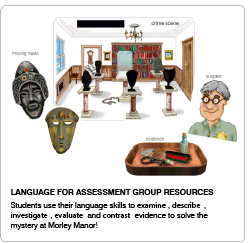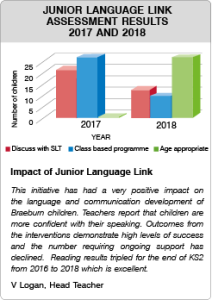SLCN is the most common primary area of need for pupils with SEN at 23%. However, when it comes to getting support through an EHCP, Autism Spectrum Disorder and Specific Learning Difficulties are identified far more frequently. So why is SLCN so often missed or mis-identified?
As young people progress through school their underlying language problems can be disguised as poor behaviour, weak literacy or even learning difficulties. In fact, it is often struggles with reading comprehension tasks that first alert staff to SLCN. Some higher level language difficulties only become apparent as the language demands increase within the curriculum e.g. using language to solve problems and understanding idiomatic language.
Schools need tools they can trust to accurately identify and support SLCN at all stages of a child’s school life. Boosting language skills can increase attainment and life chances for individuals, and that has to be worth striving for.
Literacy difficulties? Early SLCN is a significant predictor of later literacy difficulties. Snowling, 2006
Dyslexia? 50% of children diagnosed with dyslexia have underlying SLCN
40% = Children with SLCN missed or mis-identified. Bercow 10 Years On, 2018
Junior Language Link
This award winning, innovative online package combines a standardised assessment, planned interventions, resources and measured outcomes. Empowering schools to take control of their own SLCN needs, Junior Language Link improves children’s understanding to boost their literacy skills, enabling them to access the curriculum. It maximises time, budget and specialist provision.
Standardised assessment and robust reporting
Junior Language Link is the only standardised language assessment designed specifically for school staff. Use it to quickly screen children to identify any language comprehension difficulties.
Fun, quick and easily accessible, this powerful accurate assessment screens children’s understanding across 7 key areas, enabling schools to identify where language difficulties are underpinning poor behaviour or under achievement.
Instant results and reports highlight a child’s specific areas of need, so the school can act quickly in providing appropriate information to parents, staff and specialist services. Our inspection-ready reporting and provision maps provide the SENCo tools to show the impact of SLCN work throughout the school.
Key Areas of Language:
Grammar
- Verb Tenses
- Negatives
- Complex Sentences
Vocabulary
- Concepts
- Association
Meaning
- Figurative Language
- Narrative Inferences

Junior Language Link WINNER 2018 for Primary Resource Tool for leadership, management & assessment at the ERA Awards.
The judges said:
“Highly impressed – the platform not only offers opportunities to track and trace student progress, but also provides well-designed suggestions and strategies for teacher intervention.”
Intervention and support
Junior Language Link provides planned and resourced interventions for a graduated approach to supporting SLCN. Our whole class strategies and resources allow teachers to support children at a universal level, cutting down on planning, preparation and assessment (PPA) time.
Our fully resourced language intervention groups are delivered by support staff. Over 600+ resources are available for staff to use, including an extensive range of support materials for parents.
Junior Language Link is further supported by our experienced and knowledgeable Help Desk. Staffed by SLTs, teachers and support staff, we can provide specialist advice and support promptly to schools.
Impact on learning
The Language Link approach has measurable impact on children. Across one year, children participating in interventions made on average 16 months’ progress in just 8 months. 69.2% of staff surveyed believed that Language Link had a positive impact on attainment and 93% reported they had seen improvements in understanding, communication, listening and participation in class.
Staff have also reported changes in their practice from using Language Link with a significant increase in the use of appropriate classroom support strategies.

Language for Assessment Group Resources
Students use their language skills to examine, describe, investigate, evaluate and contrast evidence to solve the mystery at Morley Manor!
Junior Language Link Assessment Results 2017 and 2018

Impact of Junior Language Link
‘This initiative has had a very positive impact on the language and communication development of Braeburn children. Teachers report that children are more confident with their speaking. Outcomes from the interventions demonstrate high levels of success and the number requiring ongoing support has declined. Reading results tripled for the end of KS2 from 2016 to 2018 which is excellent.’”
V Logan, Head Teacher
Making a difference
We asked some of our customers to tell us about the difference Junior Language Link was making in their schools.
“A year 5 girl went all the way through the school but without making the expected progress. No-one was sure why. We used the Junior Language Link assessment and she came out as significantly impaired – everyone was really surprised. She was struggling with the complexity of the language and was struggling to retain instructions.” – Aldermoor Farm School
“This year we rolled out Language Link across the whole school. We were amazed at the progress. The children cannot wait to come to the sessions and carry the skills (learnt) through into the classroom.” – Primary School, Isle of Wight
“The intervention sessions are easy to follow and recording the progress of the children is simple. Within the first few weeks there was noticed improvement in the children’s listening and concentration skills. The children have also now begun to support each other within the sessions and the peer support given is now evident in class situations too.” – Teacher, Overdale CPS
Please login to view this content
Login